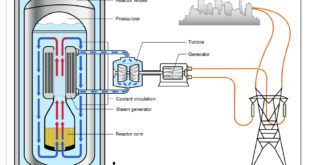As Ratepayer Rebellion Rages in Florida, Small Modular Reactor and “CWIP” Advance Financing Drive Stopped Dead in Iowa; Next Battleground States: Missouri and North Carolina.
Though its trials and travails at the national level get all the attention, the nuclear power industry is finding fewer and fewer friends in statehouses across the nation. In the Southeast, traditionally the stronghold of new nuclear power projects, a growing ratepayer rebellion in Florida seeks to curb advance financing of reactors that experts say will most likely never be constructed. In Iowa, even Warren Buffett could not help to persuade state lawmakers to permit advancing financing of a small modular reactor (SMR) in that state.
The Iowa defeat marked the nuclear power industry’s failure in its first attempt to push its much-ballyhooed SMR technology through a state legislature. Opposition to advance financing of a new reactor is so strong in Missouri that the industry has been forced to go to Washington, D.C., to seek a $452-million taxpayer-funded grant in the absence of state-level and Wall Street support. In North Carolina, diverse groups are coming together to block a push by Duke to liberalize construction work in progress (CWIP) provisions to dig even deeper into the pockets of ratepayers in that state.
Examples of the growing state-level opposition to advance financing of SMRs and other new nuclear reactors include the following:
* IOWA. The Iowa Legislature adjourned last week without passing a bill that would pave the way for MidAmerican Energy to charge ratepayers in advance for new nuclear reactor construction. As Friends of the Earth noted: “The utility could have been allowed to keep the money even if construction was never completed. MidAmerican lobbied extensively for the bill but Iowa ratepayer concerns about nuclear power doomed the proposal. An Iowa Poll by the Des Moines Register in January found that over three fourths of Iowans were opposed to the measure. The legislation was unneeded — nuclear power is already allowed in Iowa if it can compete with alternatives.” The bill was opposed by a broad coalition of groups, including Iowa AARP. (See http://thegazette.com/2012/05/20/nuclear-bills-failure-a-win-for-all-iowans/.)
* MISSOURI. The Missouri General Assembly adjourned last week without passing a bill that would have attacked a consumer protection law passed by 65 percent of Missouri voters in 1976. “Three out of the last four years Ameren Missouri has failed to legislatively repeal or erode a voter approved consumer protection law making it illegal for monopoly utilities to charge ratepayers in advance of providing a service,” said Ed Smith, safe energy director for the Missouri Coalition for the Environment. “I fully expect another legislative attack next year on a law that has kept energy rates low in Missouri for the last 36 years.” (For a discussion of the related issues, see: http://www.stltoday.com/news/opinion/columns/the-platform/editorial-lots-of-ifs-in-missouri-s-latest-nuclear-gambit/article_e795ae6b-4544-5a13-a950-13ec99a63b4d.html.)
* FLORIDA. State and local officials made it clear on April 12, 2012 that bipartisan opposition is growing in Florida to the controversial use of so-called “nuclear cost recovery” to force ratepayers in the state to pay in advance for costs associated with four Progress Energy of Florida (PEF) and Florida Power & Light (FPL) nuclear reactors that are increasingly unlikely to ever be built. Among those filing legal action to block NCR abuses: State Representative Michelle Rehwinkel-Vasilinda, who initiated the legislators’ amicus brief, was joined by State Senators Charles Dean, Sr. and Mike Fasano. (See http://www.cleanenergy.org/images/testimony/LegislatorsAmicusBrief_FLNCRC_040912.pdf.) A growing number of local anti-nuclear cost recovery resolutions, which began with the Village of Pinecrest (located near the proposed Turkey Point reactors), are now spreading across the state, including multiple municipalities in PEF and FPL service territories, including the Miami-Dade
League of Cities, Yankeetown and Crestview, among others.
* NORTH CAROLINA. A broad coalition of environmental and consumer groups have banded together to oppose proposed legislation that would “liberalize” advanced cost recovery laws as they currently exist in North Carolina. The legislation would let utilities such as Duke Energy adjust rates annually without the consumer protections of a general rate-making case. Duke customers paid out $224 million when the company canceled its Cherokee nuclear reactor in 1982. Ratepayers are understandably wary about taking on more risk as Duke debates whether or not to even build two new reactors at the Lee site near Gaffney, South Carolina, which, in order to be viable, would require both a huge uptick in electricity demand as well as a rise in natural gas prices. May 2012 survey results of 500 likely North Carolina voters found broad opposition to rate increases to build nuclear reactors. See http://www.consumersagainstratehikes.org/wp-content/uploads/2012/05/Poll_Key_Results_CARH.pdf.
Florida State Senator Mike Fasano said: “Based on its experience with costly and delayed reactors, Florida has helped to set the example of what not to do with advance financing of nuclear power. It is inherently unfair for utilities to shift the risk to their customers, our constituents, to front the costs of massive and expensive construction projects that are not even guaranteed to be completed. These dicey investments ought to be the responsibility of utility shareholders and their investment partners who profit from them, not the average ratepayer who is already struggling to pay their monthly utility bill or keep their business afloat. In Florida, allowing utilities to recover the costs of a new nuclear power plant before the plant was even placed in service has been unfair to consumers and bad public policy.”
Steven Falck, senior policy advocate, Environmental Law and Policy Center, Iowa, said: “Common sense prevailed in Iowa to stop the advance financing of a small modular reactor. MidAmerican drafted legislation for ‘Construction Work in Progress’ for nuclear facilities in the state. The legislation would have changed traditional ratemaking principles to allow for cost recovery before a facility is complete and with no guarantee that a facility will ever be completed. The bill was amended on three different occasions to secure passage in the Iowa House last year and the Senate Commerce Committee this year. When sponsors introduced the three amendments, proponents described the amendments as providing additional protections to ratepayers, but upon close examination, the amendments did not address the shift of financial risk to customers or the ability for the utility to recoup costs for a facility that is never completed and operated.”
Edward Smith, safe energy director, Missouri Coalition for the Environment, said: “We led a ballot initiative campaign in 1976 that resulted in 65 percent of statewide voters outlawing Construction Work In Progress (CWIP). MCE and its allies have defended this law from attack in the state legislature three of the last four years. Ameren Missouri, our state’s largest monopoly utility, has been looking to expand nuclear power in Missouri since 2008. Now, Ameren Missouri wants $452 million of taxpayer money because it cannot convince legislators that paying in advance for expensive and risky nuclear power is a good idea. The Department of Energy grant would go towards the development of unproven and untested small modular reactors. If SMRs make financial sense, which they do not, the nuclear industry should use private investment money instead of risking taxpayer money on what is likely to become an ‘atomic Solyndra’.”
Matthew McKinzie, PhD, senior scientist, Nuclear Program and Lands and Wildlife Program, Natural Resources Defense Council, said: “The still substantial economic, technical and regulatory uncertainties surrounding Small Modular Reactors make their future role as a competitive, safe, clean electricity source only speculative, and given the track record of nuclear power there are reasons for pessimism.”
For more on the issues associated with SMRs, see http://www.psr.org/resources/small-modular-reactors.html.
 Alternative Energy HQ solar power for homes, wind energy, and bio fuel issues
Alternative Energy HQ solar power for homes, wind energy, and bio fuel issues





